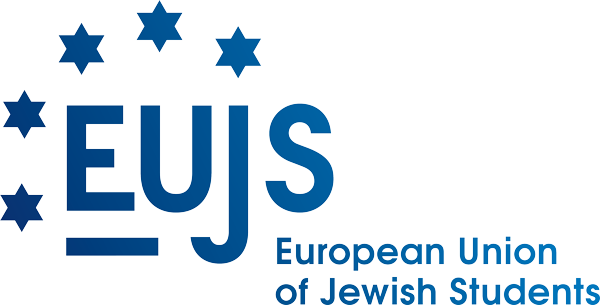On Sunday 28th February, 20 students from across Europe and the US gathered in Brussels for the second annual EU Activism seminar.
The week-long seminar, led by EUJS and Kahal Abroad, aimed to provide participants with an overview of the workings of European institutions in order to better understand European policy towards issues concerning the rise in anti-Semitism, Israel and Jewish community support.
As the primary representation of the Jewish student body in Europe, EUJS has a responsibility to provide a space for Jewish students in Europe to have their voices amplified and be heard amongst some of the most influential workers at the European level.
For this purpose, participants were able to meet and discuss with politicians, diplomats and activists in a wide range of topics. Among those invited to speak to the group were MEPs Terry Reintke (Green Party), Péter Niedermüller (Socialists and Democrats), Afzal Khan (Socialists and Democrats) and Juan Fernando López Aguilar (Socialists and Democrats). Also meeting with the group was Deputy Ambassador of the Israeli Mission, Shuli Davidovich and Coordinator for combating anti-Semitism, Katharina von Schnurbein.
Speakers started by providing the group with a summary of their work before detailing some of the most pressing issues at the EU such as the refugee crisis, migration and international terrorism. In addition speakers also expressed their views and attitudes towards ways of combating anti-Semitism, the EU’s relationship with Israel as well as issues affecting Jewish students on university campuses, primarily BDS. Speakers were keen to engage in these issues and were enthusiastic about the prospect of meeting young activists who were able to provide speakers with clear insights and ideas for implementation within the EU. Most notably, a majority of speakers addressed the lack of clarity regarding the methodology of calling out anti-Semitism and were vocal in their desire to produce a collect call for the Parliament to re-establish a working definition of anti-Semitism – something that had been removed in recent years.
On the conference, UK participant Zachary Confino said: “The EU Activism seminar allowed me to experience the EU institutions from a first-hand perspective. Not only has it helped in understanding EU law but also renewed my inner activist.”
As well as providing the space for important discussions, the seminar also gave participants to meet other students from around the world and share a meaningful experience in Brussels. This left participants feeling enthusiastic to continue their work as student activists both on campus and with future political initiatives.
Testimony: Student activism, the EU and Brexit: Reflections by Zachary Confino
The European Union is presented as a distant, foreign and distinctly European problem. There is little to no emphasis or coverage on the potential the EU can offer British citizens. Consequently, and within the context of the Brexit debate, many Britons are reluctant to engage with European politics, me included. I am relatively new to the world of student politics and activism – I entered this world more out of necessity rather than any other consideration. However, through the lens of a young, passionate and devoted activist you begin to see different opportunities that can provide ever more diverse opportunities to express your opinions.
An extremely important outcome from this seminar on EU activism, if any, must be a fundamental change in my perceptions of the EU. The EU is no longer a foreign concept for me. The concept of euroscepticism becomes, from my perspective, increasingly irregular and incomprehensible. The focus by the Brexit camp on the issues with Europe, the influx of immigration and the lack of control over our own sovereignty is continually cited as the fundamental reason for leaving the EU behind us. Such a panglossian ‘cost/benefit’ analysis of what the EU offers the UK is dangerous.
The four fundamental freedoms made the basis of European integration, from which Europe would be so intertwined that any future war would be impossible. The population, services, goods and capital of each Member State would be spread gradually across the Continent. From the perspective of an avid activist, the EU provides a platform for concerted action – something that would be impossible without overarching institutions such as the Parliament and the Commission.
The EU Activism Seminar allowed me to experience the EU institutions from a first-hand perspective. Engaging with MEPs and Commissioners on a one-to-one basis was an invaluable experience. Not only has it helped in understanding EU law but also renewed my inner activist.
Seeing what young activists like myself are achieving all across Europe is very thought-provoking and we were able to bond over experiences and share tactics. I came out of this seminar on Thursday a more devoted, capable and passionate activist than the person who arrived in Brussels on Sunday.






















